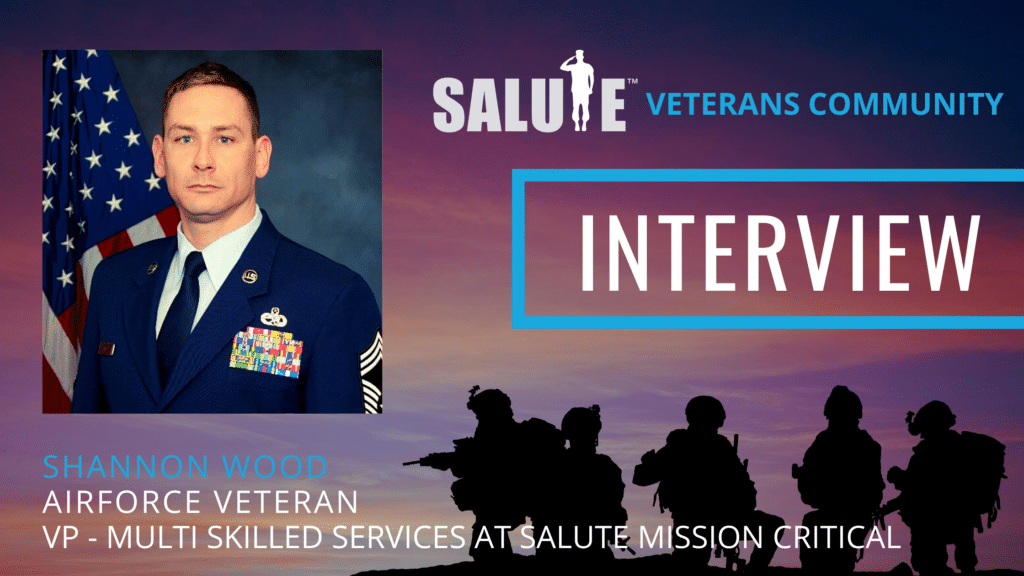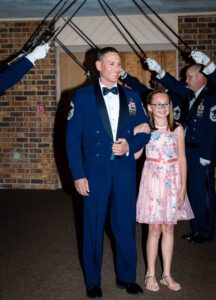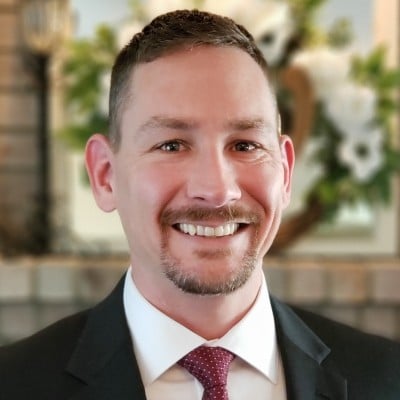
What is the Salute Veterans Community?
The Salute Veterans Community is a unique cohort of veterans who serve as examples of the value military training and experience bring to our industry. The Veterans Community supports Salute’s mission and strives to achieve our shared vision of providing veterans and military spouses career opportunities in the data center industry. We are proud of these veterans for giving back to other veterans seeking to start careers in this industry.
Lee Kirby, Salute Co-Founder, and retired Army colonel interviewed Veterans Community member Shannon Wood, VP – Multi-Skilled Services at Salute Mission Critical and Air Force Veteran.
Before we dig in, our readers would love to get to know you a bit. Can you tell us a bit about your childhood?
I had a good childhood and would categorize it as normal as it could be for a family whose primary provider was a career military professional. Our family dealt with multiple moves, like most military dependents, since my father was active-duty Navy, and my mother was a Navy reservist. However, most of our relocations were concentrated to the early years of our lives, oddly enough for a Navy family. I grew up in Oklahoma City, Oklahoma, since the age of eleven. Not sure how a sailor sustains the last half of his career in a land-locked location, but I suspect that my father made a lot of career impacting decisions to keep his family stable and in one place (thanks, Dad!).
After graduating high school, I tried my hand at college and working because I didn’t really know what I wanted to be when I “grew up”. That lasted just under a year because, as it turns out, working 50-hrs a week as a night security guard AND taking a full load of college classes is no easy task. Especially since I barely graduated high school due to a lack of effort and immaturity. I am not sure why I thought college would be any different. I was nowhere close to being ready for that level of focus. At 19 years old, I was burned out academically, professionally, and socially so I decided that I needed some purpose and direction.
And then is when I decided to join the United States Air Force.
And what are you doing today?
Today, I proudly serve the professionals at Salute Mission Critical as the Vice President of Multi-Skilled Services. My elite team of talented professionals performs a wide variety of critical maintenance actions throughout the entire life cycle of data center operations for colocation and hyperscale partners all around the globe.
Can you tell us a bit about your military background?
I was a fighter aircraft maintainer or Crew Chief as we call it, for my entire 22+ year career. Crew Chiefs are responsible for the upkeep of their assigned aircraft. As you can imagine, there are many different complicated systems that work together to ensure that aircraft can perform their intended use. Some maintainers specialize in individual systems like hydraulics, avionics, electronics, weapons, and structural, to name just a few. However, the crew chief is responsible for knowing them all and understanding the integration of all systems to troubleshoot and repair issues effectively. I’ve worked on several different airframes and filled a variety of positions during my career. Changing aircraft and positions was often a challenge, but I believe it forced me to refine my ability to adapt and change very quickly.
Can you share the most interesting story that you experienced during your military career? What “takeaway” did you learn from that story?
When I first enlisted in the Air Force in 1997 and found out that I would be a fighter crew chief, fixing multi-million-dollar fighter aircraft, I couldn’t have been more excited and ready to contribute. I was hungry and just about every day throughout my technical training, there was something new to stimulate my need for purpose; I was learning how to maintain the most sophisticated fighter aircraft in the most dominant Air Force in the world. There came a time in my training (which lasted about 8-months) where I had become very comfortable with the principles of aircraft maintenance, and we started to perform the same tasks over and over to gain proficiency. The last 4-weeks of training were designed to master the launch, recovery, refueling, and inspection actions for the F-16 aircraft. We performed these tasks all day, every day and I became exhausted over the monotony of it all and was already looking towards what was next. I wanted to be done with training, work on operational aircraft, and find my purpose.
After 6-months of working at my first duty station, I distinctly remember wishing that I never became a crew chief because it seemed like most of my days were filled with the same four tasks that I had perfected in training. Eventually, I gained enough experience and credibility to move to the shift where most of the heavy maintenance was performed. It didn’t take long and after several months, I found myself, yet again, dejected and unmotivated at the thought of spending hours, days, weeks, and perhaps the rest of my time fixing aircraft, only to have them break and start the repair cycle all over again. What was the point?
Early in 1999, my unit got the call to deploy in support of Operation Allied Force. NATO launched a multinational air campaign against the Federal Republic of Yugoslavia President Slobodan Milosevic for committing ethnic cleansing atrocities against Kosovar Albanians. My unit’s mission was to perform the Suppression of Enemy Air Defenses and our aircraft were armed with high-speed anti-radiation missiles designed to protect the entire air package from the enemy’s surface to air missile sites; if one of them lit up, our pilots would take them out.
Finally, I was about to contribute and find some purpose. My first deployment was in support of a real mission and the sole mission was to prevent genocide. We were flying 7×24 and my first couple of days were full of performing those mundane tasks from technical training: launching, recovering, refueling, and inspecting aircraft. Granted, it was neat to see the jets leave with missiles and return empty, but I struggled to connect how my actions, the very same ones I had previously mastered, helped prevent horrific acts against other human beings.
My third day in the country was one that I will never forget. One of our youngest pilots arrived at my jet and as I walked around with him doing our pre-launch inspection, I could tell that he was extremely nervous. This continued during our engine running operational ground checks and I had to guide him through the entire sequence. Eventually, we were able to complete all procedures and I marshaled him out of the spot and off he went to perform his mission. Almost five hours later, my jet returned, empty of missiles, and when the jet shut down, the pilot got out and the very first thing the young lieutenant did was hug me and say, “Thank You”. Why was this officer, a pilot in the world’s most formidable Air Force, hugging me, a young, enlisted maintainer? He told me that if the jet wasn’t perfect and able to perform as expected, then he might not be alive. I had no idea just how dangerous the conditions were up there and that every time they approached the no-fly zone, they were constantly being peppered with anti-aircraft artillery and had to spend the entire flight performing evasive maneuvers just to avoid being shot down.
My purpose was right in front of me the whole time and I couldn’t even see it. I was too focused on what was next: promotion, responsibility, recognition, acceptance. My job was to make sure that the aircraft was perfect in every way so that the pilot could fulfill his purpose and return to his family.
So, I learned from that situation that everyone has a role in an organization that contributes to the bigger picture. Take pride in your duties and aim to master whatever you’re responsible for. Find a way to be satisfied and the rest will come.
Shannon Wood
Do you think your experience in the military helped prepare you for business or leadership? Can you explain?
Yes, no doubt about it! The military is an extremely dynamic environment regarding personnel changes. The team you are a part of and/or leading today is most definitely not the same team you will be a part of next month. Folks are constantly coming, going, separating, retiring, or promoting (from the newest technicians to the top-level leaders). That changes team dynamics in a big way, and the people that remain behind must continue to move forward and complete the mission. The turnover cycle literally never ends, and it forces everyone to pivot and quickly adapt to the new variable. It could be that some new trainees arrive, therefore, the focus shifts to training. Or perhaps the most experienced teammate moved on to another assignment and now the team must figure out how to compensate for the experience gap. And quite possibly the most fun change of all, the departure and subsequent arrival of new leadership. They always seem to bring a fresh perspective and new way of doing business. Therefore, the entire team will learn how to adapt to their new leader(s).
Because you’re in a perpetual state of change, you become very comfortable knowing that the direction you and your team are currently heading will undoubtedly change soon. You learn how to approach every situation calmly, rationally, and with the attitude that everything will come together. Additionally, you learn to trust those around you to do their part. Empowering folks to do their job is one of, if not the, most impactful tool in any leader’s toolbox. There aren’t enough hours in the day for any one person to do everything; trust in the team!
None of us can achieve success without some help along the way. Is there a particular person who you are grateful for who helped you get to where you are? Can you share a story?
Rather than narrow it down to a particular person, I would like to recognize my family for always being there and holding strong. Whether they were picking up the slack because I was working long hours, deployed for extended amounts of time or just needed some quiet time to study for promotion or college, they were (and still are) always there to show me support. Amanda, my beautiful wife, gave up a very promising career in the Air Force, after eight years, to stay at home and take care of our youngest daughter. Mackenzie, my oldest daughter, has always been my best little friend and probably my biggest fan. Madeline, my youngest daughter, is the strongest and happiest person I’ve ever met despite being physically and mentally handicap-able.
Additionally, I’ve always been a part of the most fantastic teams throughout my career. Full of support for one another and laser focused on the mission. My Salute team is no different.

You are a part of the Salute Veterans Community, which shares a common passion for helping veterans get into the data center industry. It is centered on veterans helping veterans. Why is this important to you?
Very few military job families translate cleanly into this trade yet; I feel veterans are way more capable than their military specialty gives them credit for. They have a lot to offer and can significantly impact any organization and create a successful career serving in this industry.
I entered this industry entirely by accident after retirement. I had zero data center knowledge and my resume focused on my aircraft maintenance and leadership experience. However, Salute contacted me and asked if I would be interested in learning more about a Project Manager position in my area. The rest, as they say, is history (albeit only one and a half years’ worth of history). Salute truly recognizes that veterans are built to adapt to any situation. Regardless of how long someone has served, you can bet that they have been consistently exposed to new and unfamiliar situations. This fosters a culture for continuous growth and creates life-long learners that possess the uncanny ability to thrive in dynamic situations.
You are a person of great influence. If you could inspire a movement that would bring the most amount of good to the most amount of people, what would that be? You never know what your idea can trigger.
Be ok with not knowing and being wrong. Above all, NEVER chastise someone willing to be vulnerable enough to declare as such.
Sounds simple enough, yet I’ve found that this is one of the hardest things for people to embrace. Everyone wants to be respected and all too often, we feel like being right and appearing like the smartest person in the room is the way to get there. In my experience, the most productive teams are ones with a culture of acceptance, collaboration, respect for diversity, and open communication. If you find yourself a part of a team where people fare not speaking up and asking questions, then that team will never operate at its maximum potential. They will forever be limited by the ideas and direction of the loudest person; this kills innovation and leaves some fantastic thoughts on the table.
Everyone’s journey to their position is different. How they interpret situations is based on experiences that are unique to them, therefore, create a culture of trust where everyone feels comfortable sharing. Amazing things will happen.
How can our readers follow you online?
Readers can follow me on LinkedIn.

If you are a veteran looking for an exciting career in a growing industry, contact us at Salute. We can help put you on the path to success.
If you are looking to close the data center talent gap with individuals committed to bringing military precision to their careers, contact us. Employ the heroes of today, tomorrow.
